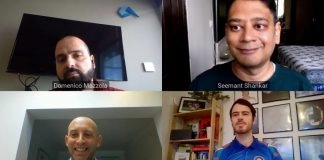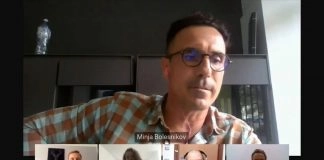It’s important to distinguish product from service, said Microgame’s Marco Castaldo, as a collection of CEOs for leading sports betting and gaming suppliers discussed the best way of working with operators on a multi-jurisdictional basis.
Speaking at Betting on Sports Europe – Digital in the ‘Market fragmentation – Supplier CEO Panel’, sponsored by Altenar, Castaldo was replying to an opening set of remarks by session moderator Rory Anderson, a consultant for 12Bet.
Asked about finding the streamlined tech vs localisation balance, and whether the dotcom product was a thing of the past for sports betting, Castaldo said: “It’s not all black and white.
“If the question is how do you provide a multi-jurisdictional product, the first point you need to recognise is that this trend of fragmentation for regulated markets changes the B2B business model. Clearly, you must separate the components which can be shared across jurisdictions with what has to be strictly local.
“To do this, it’s important to distinguish product from service, and for the B2B supplier to really frame what kind of offer they are supplying to customers. On the product side, you have local specificities, for example multichannel is a big deal in Italy so if you don’t have a multichannel setup it’s difficult to be competitive in the market.
“And then there are obviously local compliance complexities that require strong local support and service. So if you frame your offer, not as providing a product or a feed but as providing a service, I think you have a more compelling offer for a regulated market.”
This idea of local value adding services on top of the core product was picked up on by Aspire Global CEO Tsachi Maimon, who explained: “It’s becoming much more difficult for operators in regulated jurisdictions, and they are looking for additional added value from the product itself. A lot of operators are asking for these additional services.
“This is something the supplier can take forward and give a hand with, whether it’s through a call centre, QA services or any additional things that will help the operator become more localised and with less cost.”
For Altenar CEO Stanislav Silin, the challenge is to provide a ‘hybrid’ product, bringing together the best technology with the necessary localisation. “Your goal is to have as unified or streamlined technology as possible, but at the same time a product that draws back to some traditions, regulatory requirements and cultural differences,” he said.
“So it’s a hybrid. And, therefore, one thing that operators or B2B suppliers should do is have flexible enough tech but combined with good knowledge of the specific markets.”
Warren Russell, Founder and CEO of W2 Global Data, agreed by saying: “It is a hybrid approach now. It’s about working with the subject matter experts or the in-country experts and taking much more of a platform and varied approach. There is no one size fits all.
“As consumers, as suppliers, as merchants, as operators – whatever it might be – everything we want now is driven by choice. Unfortunately, that means operators have to get familiar with working with multiple suppliers, multiple jurisdiction requirements.
“There are two ways of doing it – either you become the expert yourself or you work with local experts and come at it from an aggregator approach.”




